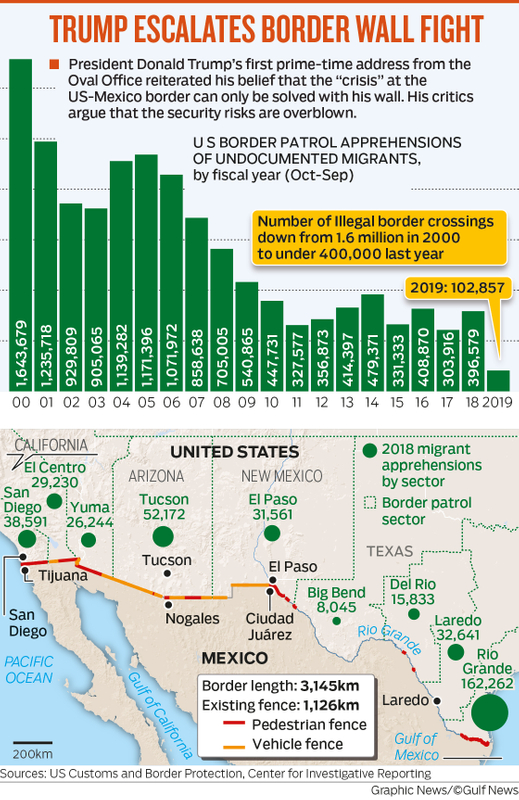_resources1_16a3106d2f2_medium.jpg)
Washington: President Trump took his disputed claim of a national security crisis at the southern border directly to the American people on Tuesday night, for the first time speaking from the Oval Office in prime time to try to enlist public support for $5.7 billion (Dh20.93 billion) for his long-promised wall.
“There is a growing humanitarian and security crisis,” Trump said in a 10-minute address, sitting at his familiar desk. He added, “All Americans are hurt by uncontrolled illegal migration.”
Constructing a steel barrier, as he called it, is “absolutely critical to border security. It’s also what our professionals at the border want and need,” Trump said.
With his speech, the president aimed to put pressure on his Democratic opponents — but his more immediate problem is the need to shore up support among Republicans. Even before Trump spoke, that backing seemed to be eroding, with several Republican senators calling for an end to the shutdown regardless of funding for the wall.
Televised rebuttal
Moments after Trump’s speech, House Speaker Nancy Pelosi of San Francisco and Senate Minority Leader Charles E. Schumer of New York delivered a televised rebuttal, complaining that the president was manufacturing a crisis to stoke fear, as they made the case for reopening the government before any negotiations about border security.
The president stopped short of declaring the national emergency he’s spoken of in recent days, which he’d said would allow him to bypass Congress and tap existing funds for a wall. He also steered clear, after days of criticism, of repeating some of the false claims he has made that thousands of terrorists were crossing the border.
To broaden his case, Trump depicted a wall as just one of a package of responses to the problem at the border, including more money for agents and for facilities to screen and detain migrants, most of whom are women and children.
But as he often does at political rallies, the president vividly described a few violent crimes allegedly committed by people who are in the US illegally.
“To those who refuse to compromise in the name of border security,” he said, “I would ask: Imagine if it was your child, your husband, or your wife whose life was so cruelly shattered and totally broken?”
His address came as part of a public relations offensive intended to break a standoff with lawmakers that has blocked funding for about a quarter of the government, keeping affected agencies closed since December 22 for the longest such shutdown since 1996. By Saturday, if unresolved, it will surpass that record.
The impasse has left about 800,000 workers without salaries this week, though about half must still report for work. It has closed popular national parks and left others opened but ill-attended and filling with trash. Real estate closings, farming plans and other businesses that depend on federal offices have been disrupted, reflecting the increasing number of disrupted services reliant on the government.
Trump has argued, despite polling to the contrary, that federal workers and other Americans would accept any such sacrifices, given their support for his stand for a border wall to keep the country safe.
Apprehensions at the southern border have been declining for two decades, and no terrorists are known to have crossed it.
Limited consensus
Democrats and advocates who favour less restrictive immigration policies dispute that a crisis has ensued. There is some agreement on the humanitarian imperatives, including the need to spend more money on immigration judges and other officials needed to process refugee claims that have piled up, in part because of administration policies discouraging such claims.
Democrats also have called for investigating detention centres at the border after the recent deaths of two migrant Guatemalan children in US custody.
Days after Democrats assumed control of the House last week amid the standoff, the White House on Monday hurriedly arranged the Oval Office address as Trump has tried to dominate the debate this week. He also sent Vice-President Mike Pence on a series of interviews with network news reporters on Tuesday morning.
Trump and Pence are expected to meet with Republican senators at the Capitol on Wednesday, and Trump plans to go to the border in McAllen, Texas, on Thursday.
The president predictably sought to lay blame for the impasse on Democrats.
“The federal government remains shut down for one reason and one reason only — because Democrats will not fund border security,” he said.
‘Expensive, ineffective wall’
Pelosi noted that Trump had rejected bipartisan bills in the Senate and House to reopen government “over his obsession with forcing American taxpayers to waste billions of dollars on an expensive and ineffective wall — a wall he always promised Mexico would pay for.”
Schumer added, “The president just used the backdrop of the Oval Office to manufacture a crisis, stoke fear and divert attention from the turmoil of his administration.”
He said Democrats were not opposed to spending for border security, but only for the wall.
Democrats, who have not been willing to approve more than $1.3 billion in additional border security funding, haven’t budged during the 18-day standoff.
Pelosi and Schumer had demanded the television networks allow them time to respond. The duelling speeches gave the evening the air of a State of the Union address, an annual event that is scheduled for January 29.
Presidents since Harry S. Truman have delivered prime-time Oval Office addresses, typically at moments of domestic or international significance, but Presidents George W. Bush and Barack Obama disliked the format and used it rarely as technology has given Americans more viewing and entertainment options.













